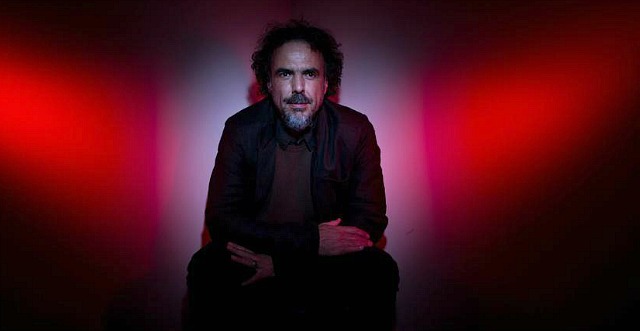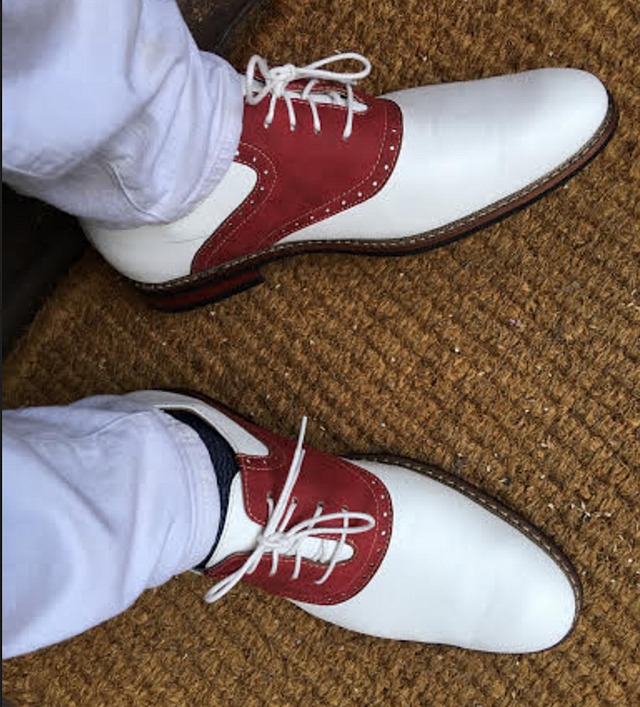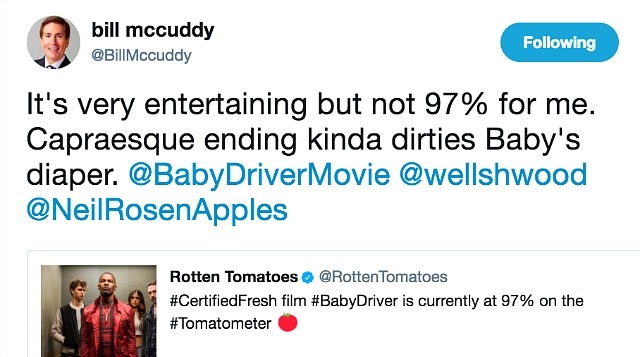President Trump actually tweeted this CG-created wrestling clip this morning. On one level a primitive macho fantasy about schooling CNN but also an encouragement to loyalists to rough up journalists. What. An. Asshole.

From a Boston reader this morning: “I’ve been seeing advertising for Andy Serkis and Andrew Garfield‘s Breathe (Bleecker Street/Participant, 10.13) and am wondering how it might perform, both commercially and critically, in the wake of David Gordon Green and Jake Gyllenhaal‘s Stronger (Lionsgate/Roadside, 9.22), which will open three weeks earlier. Both are about men, driven by a woman’s love, overcoming great physical challenges and odds against a long, full life. Three factors: (a) close release-date proximity, (b) the commonality of plot, and (c) the Andrew vs. Jake thing. Whaddaya think?”
My response: “Spiritual uplift dramas about average folks slammed by tragedy and misfortune but refusing to accept a grim fate or a curtailed lifespan have, of course, constituted a dramatic genre for the last three decades. Life threw a curve or buried them in suffering but they wouldn’t buckle. Spirit, perseverance, grit. The support of families, wives, co-workers, etc.
Breathe and Stronger are kin of all kinds of films in this realm. Ben Lewin‘s The Sessions, in which the life of polio victim John Hawkes was spiritually opened up by Helen Hunt‘s sex surrogate, is similar to Breathe as they both deal with guys paralyzed from the neck down. The total paralysis enveloping Mathieu Amalric in Julian Schnabel‘s The Diving Bell and the Butterfly (’07) is even more extreme.
Stronger is about real-life Boston bombing victim Jeff Bauman (Gyllenhaal) overcoming the loss of his legs, obviously a less daunting challenge than the one facing Garfield but still a tough haul.
Expand the pain parameters and you could include The King’s Speech (royal stuttering), all kinds of concentration camp dramas (Angelina Jolie‘s relatively recent Unbroken, Robert Young‘s Triumph of the Spirit, Joseph Sargent and Arthur Miller‘s Playing For Time), Jim Sheridan and Daniel Day Lewis‘s My Left Foot (a seminal physical-malady film, released in ’89), innumerable disease-of-the-week TV dramas from the ’80s, etc.
Thanks to Alejandro G. Inarritu and Katie Calhoon for allowing Tatyana and I to attend the LACMA installation of Carne y Arena at the last minute. We went late yesterday morning; it opens today. Intense, jolting, emotional, essential. The whole run (ending sometime in September) is sold out. Here, again, is my piece about visiting the Cannes film Festival installation (posted on 5.18.17). And here’s a nicely descriptive 6.29 L.A. Times piece by Carolina Miranda. I was studying the particulars a bit more this time; I could do this another few times easy. But I’ll never park inside the L.A. County Museum garage ever again. $16 for 66 minutes, kiss my ass. Which is another reason why I’m mostly a two-wheel man. I never pay anything for parking the bike (I just weave around the gates), and no one ever gives me a ticket.


Urban Dictionary says the primary definition of “kicks” is shoes, but what they really mean is spiffy shoes. I haven’t heard anyone say the word “kicks” in this context since the Ford administration, if that. Some words die from attrition; the culture loses interest and they fall off the vine. Has anyone used or heard “kicks” anytime this century, or even during Reagan-Bush-Clinton? There’s one shoe term that I know is dead and gone for the most part, and that’s “sporty.” The only people who say “sporty” are 70something guys who play golf or conservatives who own yachts or older Wall Street dicks. In Out Of The Past Robert Mitchum bought a pair like this when he was in Acapulco looking for Jane Greer, and then suddenly Kirk Douglas showed up, looked down at the new shoes, grinned and called them “sporty.” That was 70 years ago. “Sporty” is finished.

Dan Savage to Bill Maher around 5:05: “There’s no such thing as a blue state — there are red states with big blue cities in them. What Democrats have to do is unapologetically be the party of urban America the way Republicans are unapologetically the party of depopulated America, the party of rural America, exurbs and suburbs. If more people had turned out in the cities, Donald Trump would have never won the election. Democrats need to stop chasing voters they’re never going to get. Sending John Kerry out to shoot something with a gun right before the election didn’t win him any votes in knuckle-dragged America.”
I hate the hyphen, for one thing. I hate that they’re rebooting Spider-Man for the second damn time. I hate the idea of paying to see a film that is entirely about drooling corporate hunger. I hate the obliging whore instinct that played a part in the current 94% RT score. What’s in it for me to sit through this thing? Maybe a little amusement or diversion, but how long is this Marvel Comic Universe shit going to continue? You know the answer. Until people start saying “Fuck Kevin Feige…I’m bored and I’m done.” I just don’t want to see Spider-Man: Homecoming. I really, really don’t. Who’s with me? That was a joke. The studios crank out another and the herd comes right over and starts slurping. I’ve loved a few Marvel flicks but c’mon, man…enough. Okay, I’ll come back for Ant Man 2 if Peyton Reed directs, and for Black Panther. But you know even Black Panther is gonna be more or less the same old slop in the trough.
I tried to hang this IKEA kitchen storage thing in the proper way. I measured everything six ways from Sunday, and then oh-so-carefully drilled the two holes, inserted the anchors, re-measured and eyeballed the damn thing and whirred the screws into the wall. Tweaking, adjusting. It’s very hard to do this right if you’re all alone. Did I use a level? No, but I kept eyeballing it over and over…this angle, that angle, standing back, tilting my head. Don’t go by this photo — it’s very close to being perfectly level. Alas, my eye is telling me “nope, it’s off by a just a scosche.” Fuck it — I raised the right side with a couple of finishing nails. Now it’s fine.

If only the Americans who are too dumb or deranged to see what’s happening to this nation under Donald Trump (backwater dumbshits, arch-conservative banshees like NRA spokeswoman Dana Loesch, etc.)…if only these lunatics would listen to Neil Young‘s “Children of Destiny“, their minds would start to change and the general tide of rightwing insanity would start to recede, thus paving the way for a Congressional turnaround in ’18, which would presumably be followed by Trump’s impeachment. Incidentally: Whatever happened to Young’s Pono player?
You don’t have to be an incorrigibly dull, low-wattage flatline type to wake up this weekend and say “let’s go see Despicable Me 3!” But it would help. For those with a passing interest in what’s really happening at the movies over the Independence Day holiday, the only thing to talk about is Baby Driver.
Jett caught an Arclight showing yesterday afternoon (he tried for The Big Sick but it was sold out) and loved it. “You liked the ending, the last 15 or so?” I asked, somewhat incredulous. Yeah, he said. “But you’re a huge Drive fan!” I countered. “That was a different thing,” Jett replied. “This is a kind of satire of Drive with a La La Land attitude.”
What’s the verdict from the HE first-wavers who caught it last night or the night before? Deadline is projecting a five-day Baby box-office of $27 or $28 million.

Weddings are often described as joyous, touching, festive, life-affirming and maybe a bit nerve-wracking, at least in terms of pre-ceremonial jitters. But yesterday’s ceremony at La Piedra state beach — Tatyana, myself and wedding maestro Chris Robinson of oficiantguy.com — was mostly peaceful. We just did it, no prob. Smiles and serenity. The sea, blue skies, bright sun and mild breezes cooperated perfectly. We didn’t actually do the deed until 4 pm. Traffic from Sunset and PCH to central Malibu was beyond ridiculous, and the way down to the beach wasn’t a path as much as a challenge for mountain goats. But man, it was perfect. The post-nuptial celebration (including my son Jett, Svetlana and David, longtime attorney pally Mark Kane) happened at The Little Door.

You can dismiss what Richard Clarke is saying here about cyber Russian invasions (not ’16 as much as ’18 and 2020) and sea-level rise and Trump’s seeming indifference to both. Go ahead, ignore the former anti-terrorism czar who specifically warned the Bushies about Osama bin Laden‘s plans for attacking the U.S., etc.
Two days ago Aura, my eight-year-old white munchkin, began crying over apparently nothing. She wasn’t crying as much as moaning. As I was unpacking the parts to an IKEA kitchen cart, I thought Aura might have interpreted this to mean I was packing my bags for another trip, and was therefore distressed. Later that day she disappeared into the bedroom closet, not coming out to eat or anything.
That in itself persuaded me to take her to the vet, but I wanted to see if she’d rebound on her own. Last night she was lying inside the closet and moaning again, but more loudly this time. That was the first super-serious “uh-oh.” It was the same sound made by my Siamese cat, Mouse, three or four weeks before he passed from pancreatic cancer.
I decided to take Aura to the vet first thing this morning instead of late last night, figuring they’d just keep her in observation until the vet doc came in around 9 am. She was still moaning just after midnight, but less audibly, more internally.
This morning we found her dead. Rigor mortis had set in heavily, so she’d probably passed around 1 or 2 am. Our hearts are broken, and we’re getting married in three hours. People who say “oh my God” annoy me to no end, but I think I might have said OMG this morning 20 or 25 times. Picking her up was agony — it was like she was suddenly made of plaster. I called a cat crematorium guy — $200 bills for a cremation plus an urn for her ashes, and the urn will even have her name on it.